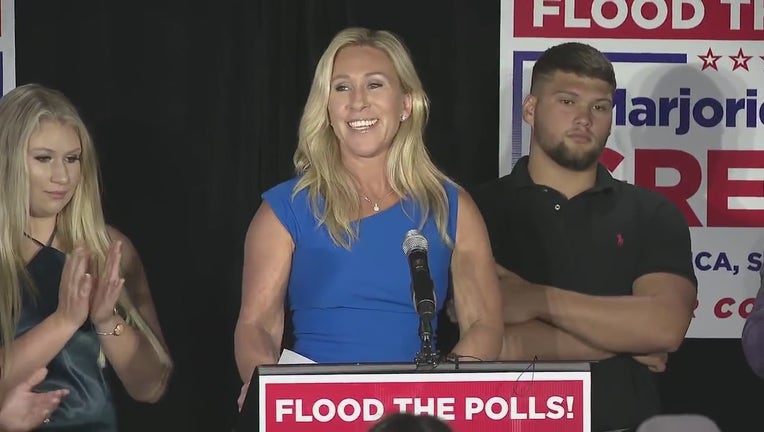ATLANTA — Gov. Brian Kemp of Georgia easily dispatched with Donald Trump’s hand-picked challenger on Tuesday in a Republican primary that demonstrated the limits of the former president and his conspiracy-fueled politics in a critical swing state.
Kemp will face Democrat Stacey Abrams this fall in what will be one of the nation’s most consequential governor’s races.
The results served as a stinging rebuke of Trump in a race that he prioritized above almost all others. Angered by Kemp’s refusal to go along with his extraordinary effort to overturn the 2020 election results in Georgia, Trump personally recruited former Sen. David Perdue to launch a primary. Trump even encouraged another Republican to drop out of the race to clear a path for a Perdue victory.
But Kemp ultimately emerged as a powerful candidate able to draw prolific fundraising totals that helped him flood Georgia with television and other ads. He tapped into the power of his office to show voters what he could do for them, unveiling a $5.5 billion, 8,100-job Hyundai Motor plant near Savannah in the final days of the campaign.
In defeat, Perdue struck a unifying tone that has become increasingly rare in a Republican Party dominated by Trump’s hardline tactics.
“I want you to know tonight that I am fully supporting Brian Kemp in his run to beat Stacey Abrams,” Perdue said. “It’s emotional for all of us, we’re disappointed, I get that. Let’s take a few hours, lick our wounds, and tomorrow morning, you’re going to hear me going to work for Brian Kemp to make damn sure that Stacey Abrams is never governor of Georgia.”
In all, five states were voting Tuesday, including Alabama, Arkansas, Texas and Minnesota. But none had been more consumed than Georgia by Trump and his lie that the 2020 election was stolen.
Perdue’s loss becomes the latest example of a primary setback for Trump’s preferred candidates, who have lost governor’s races in Idaho and Nebraska. A Pennsylvania Senate primary is too close to call a week after the election.
Still, the totality of Tuesday’s contests underscored the sustained power of Trumpism in Republican politics 18 months after he was voted out of office. His preferred Senate candidate in Georgia, Herschel Walker, easily won the GOP nomination despite warnings from Walker’s Republican competitors about his history of domestic violence and mental health struggles. He will face Democratic incumbent Sen. Raphael Warnock in the fall in a race that could determine control of the chamber.
Georgia Secretary of State Brad Raffensberger, who refused to support the former president’s direct calls to overturn the 2020 election, was in a fight to avoid what could be a challenging runoff election. Raffensperger faces three primary challengers, including Trump-backed Rep. Jody Hice. The winner will serve as Georgia’s chief election officer in the 2024 presidential election.
And former Trump White House press secretary Sarah Sanders, who was the face of an administration that contributed to the nation’s stark divide, won the Republican governor’s nomination in Arkansas.
Regardless of Trump’s involvement in their races, virtually all of the Republican candidates — even Kemp — ran on “election integrity.” That phrase that has emerged as a code for the former president’s baseless grievances about the 2020 election, which were roundly rejected by courts and his own attorney general. Conservative candidates from Georgia to Arkansas to Texas also leaned into Trump’s preferred culture wars by playing up concerns about transgender athletes, “critical race theory” and illegal immigration.
Sensing Kemp’s strength in Georgia, however, other prominent Republicans had grown increasingly willing to defy the former president.
Trump’s own vice president, Mike Pence, rallied with Kemp in the Atlanta suburbs on Monday evening.
“Elections are about the future,” he told the crowd, adding that “when you vote for Brian Kemp tomorrow, you will say yes to a future of freedom here in Georgia. You will say yes to our most cherished values at the heart of everything we hold dear.”
Meanwhile, Republicans and Democrats elsewhere were grappling with ideological and strategic divisions that will determine what kind of candidates to nominate and which issues to prioritize for the November general election.
Democrats were especially focused on a runoff election in south Texas, where longtime incumbent Rep. Henry Cuellar was facing a fierce challenge from progressive Jessica Cisneros in a race where abortion was a prominent issue. Cuellar is the last anti-abortion Democrat serving in the House.
Republicans were deciding a series of primaries that featured some of their most controversial figures.
In Alabama, conservative firebrand Rep. Mo Brooks was running to represent the GOP in the race to replace retiring Sen. Richard Shelby. Brooks, a leading figure at the Jan. 6 “Stop the Steal” rally that preceded the Capitol attack, initially won Trump’s endorsement, although Trump rescinded it after watching Brooks struggle in the polls.
Leading Trump ally Rep. Marjorie Taylor Greene won her primary election in the state’s 14th congressional district, despite a first term notable for her conspiracy theories and controversy.
On the Democratic side in Georgia, two congressional incumbents, Reps. Lucy McBath and Carolyn Bourdeaux, were running against each other in suburban Atlanta, forced into a rare incumbent-on-incumbent primary after Republicans redrew the congressional map.
Tuesday marked the first Georgia election under a new voting law adopted by the Republican-backed state legislature in response to Trump’s grievances. The changes made it harder to vote by mail, which was popular among Democrats in 2020 amid the pandemic; introduced new voter identification requirements that critics warned might disenfranchise Black voters; and expanded early voting in rural areas that typically vote Republican.
The new law also banned handing out food or water within 150 feet of a polling place, a practice common in urban areas where there are typically long voter lines.
Despite concerns about the impact of the law, there were no major or systemwide issues reported in Georgia. There were sporadic reports of polling locations opening late, minor equipment troubles and some voters finding themselves at the wrong location.
Early voting totals in Georgia suggested enormous voter interest — especially on the Republican side.
Through last Friday, 857,401 voters had cast early ballots, including 795,567 who voted early in-person, according to the secretary of state. That included 483,149 votes cast by Republicans and 368,949 by Democrats.
Those figures shattered early voting turnout in the 2020 presidential election, when a total of 254,883 Georgians voted early.
In the Atlanta suburb of Woodstock, 42-year-old land surveyor Nathan Johnston said he was voting for Kemp because of his leadership during “a tough four years.”
“We didn’t stay shut down any longer than we had to and worked our way through the pandemic, and the economy is doing pretty good, so I think that reflects well on him,” he said.
—Peoples reported from Washington. Associated Press writer Jeff Martin in Woodstock, Georgia, contributed to this report.


